UGB 110: Business Law Case Study - Consumer Rights and Sales of Goods
VerifiedAdded on 2023/01/13
|9
|2503
|35
Case Study
AI Summary
This case study analyzes a scenario where Mr. John purchases a television set and encounters issues with its quality and performance. The assignment delves into the legal rules concerning implied terms in the sale of goods and services, particularly focusing on the Consumer Rights Act 2015, which replaced the Sales of Goods Act and other related regulations. The analysis examines Mr. John's rights to remedies, including refunds, repairs, and compensation, based on the TV's failure to meet satisfactory quality standards and the breach of implied terms. The study also explores the statutory provisions on the transfer of property and possession, as well as the remedies available to both buyers and sellers in sales contracts, referencing relevant sections of the Sales of Goods Act 1979 and the Consumer Rights Act 2015. The case evaluates the store manager's responsibilities, the impact of the installation agreement, and the application of specific sections of the Acts to Mr. John's situation, ultimately concluding with an assessment of Mr. John's legal recourse against the seller for the defective product and breach of contract.
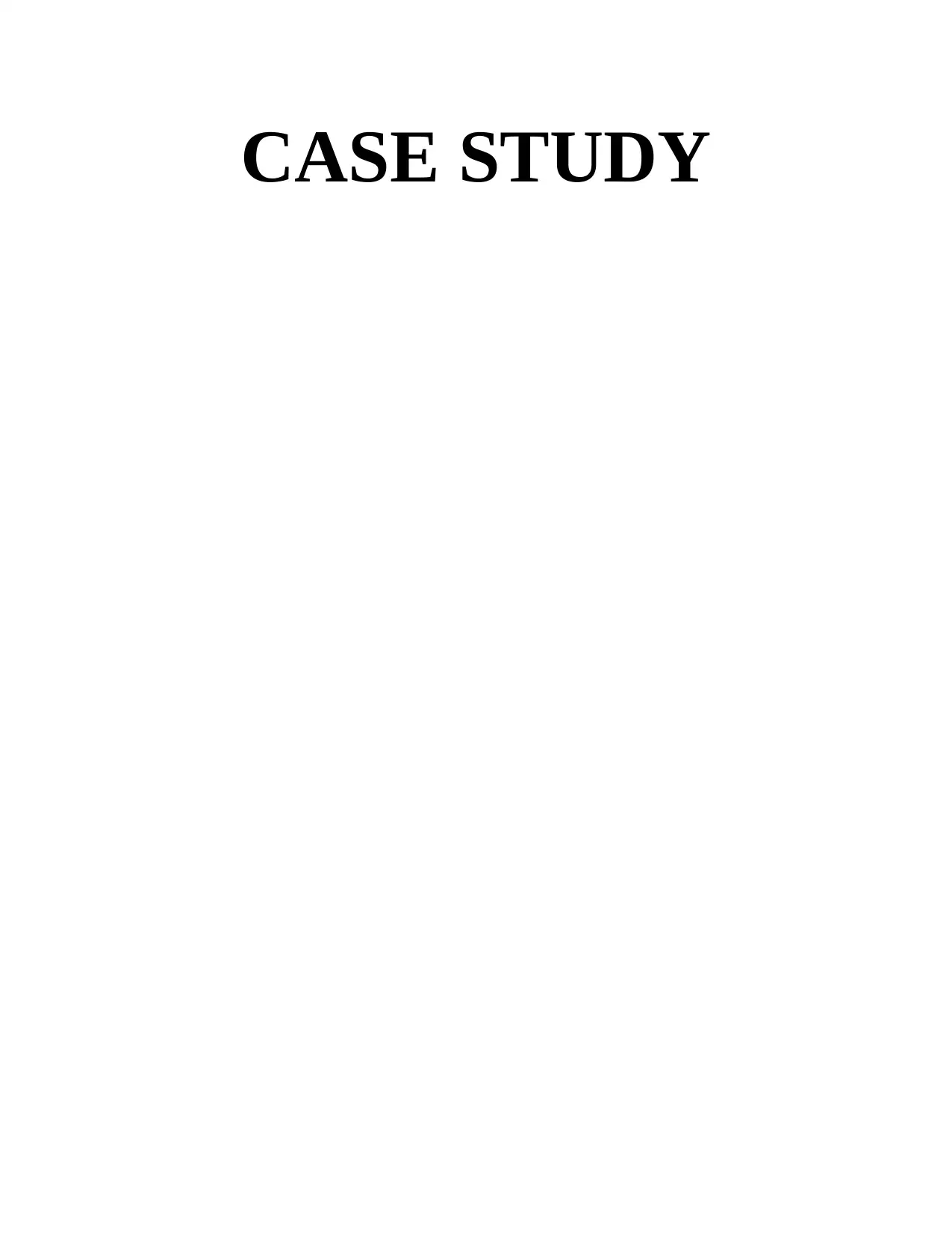
CASE STUDY
Paraphrase This Document
Need a fresh take? Get an instant paraphrase of this document with our AI Paraphraser
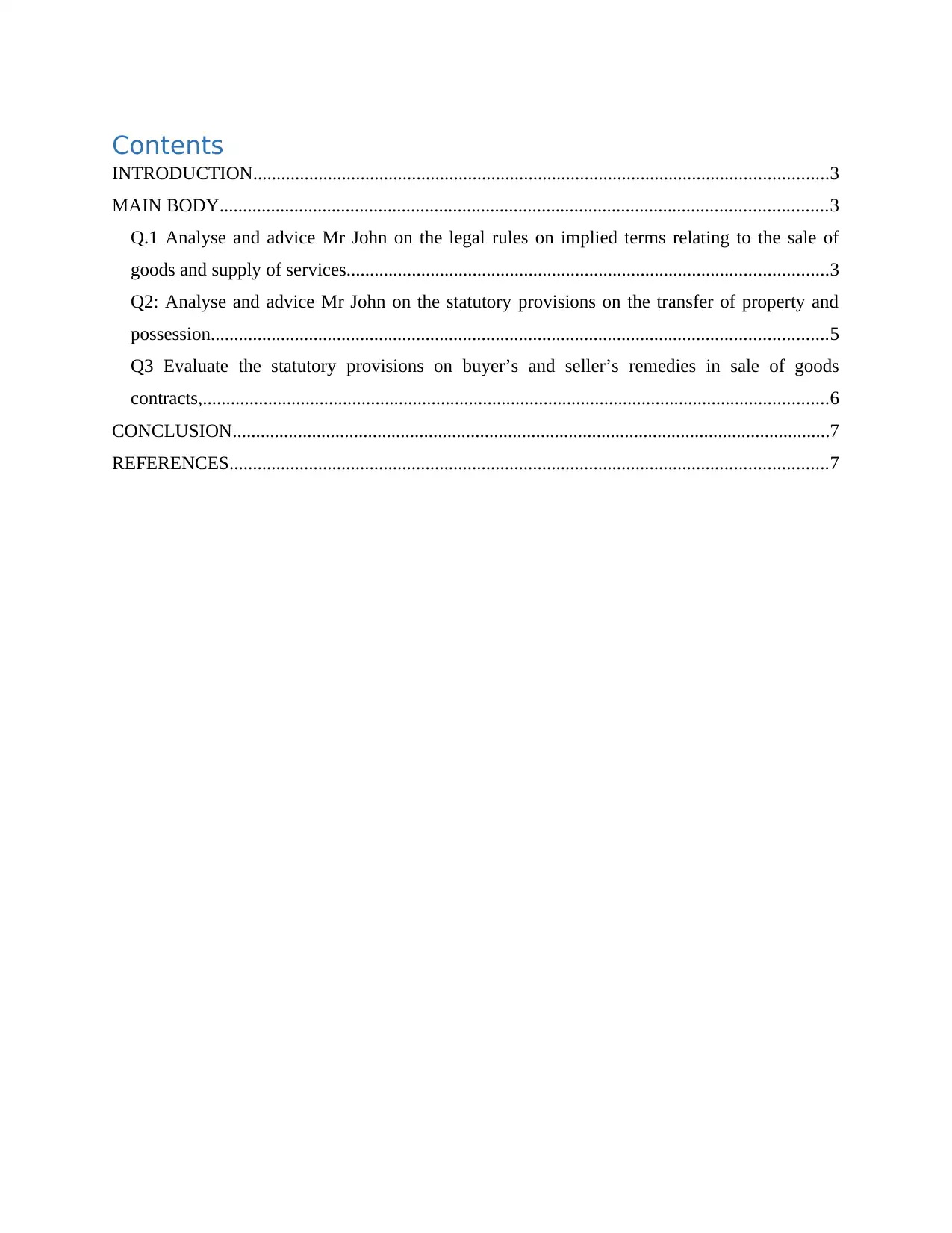
Contents
INTRODUCTION...........................................................................................................................3
MAIN BODY..................................................................................................................................3
Q.1 Analyse and advice Mr John on the legal rules on implied terms relating to the sale of
goods and supply of services.......................................................................................................3
Q2: Analyse and advice Mr John on the statutory provisions on the transfer of property and
possession....................................................................................................................................5
Q3 Evaluate the statutory provisions on buyer’s and seller’s remedies in sale of goods
contracts,......................................................................................................................................6
CONCLUSION................................................................................................................................7
REFERENCES................................................................................................................................7
INTRODUCTION...........................................................................................................................3
MAIN BODY..................................................................................................................................3
Q.1 Analyse and advice Mr John on the legal rules on implied terms relating to the sale of
goods and supply of services.......................................................................................................3
Q2: Analyse and advice Mr John on the statutory provisions on the transfer of property and
possession....................................................................................................................................5
Q3 Evaluate the statutory provisions on buyer’s and seller’s remedies in sale of goods
contracts,......................................................................................................................................6
CONCLUSION................................................................................................................................7
REFERENCES................................................................................................................................7
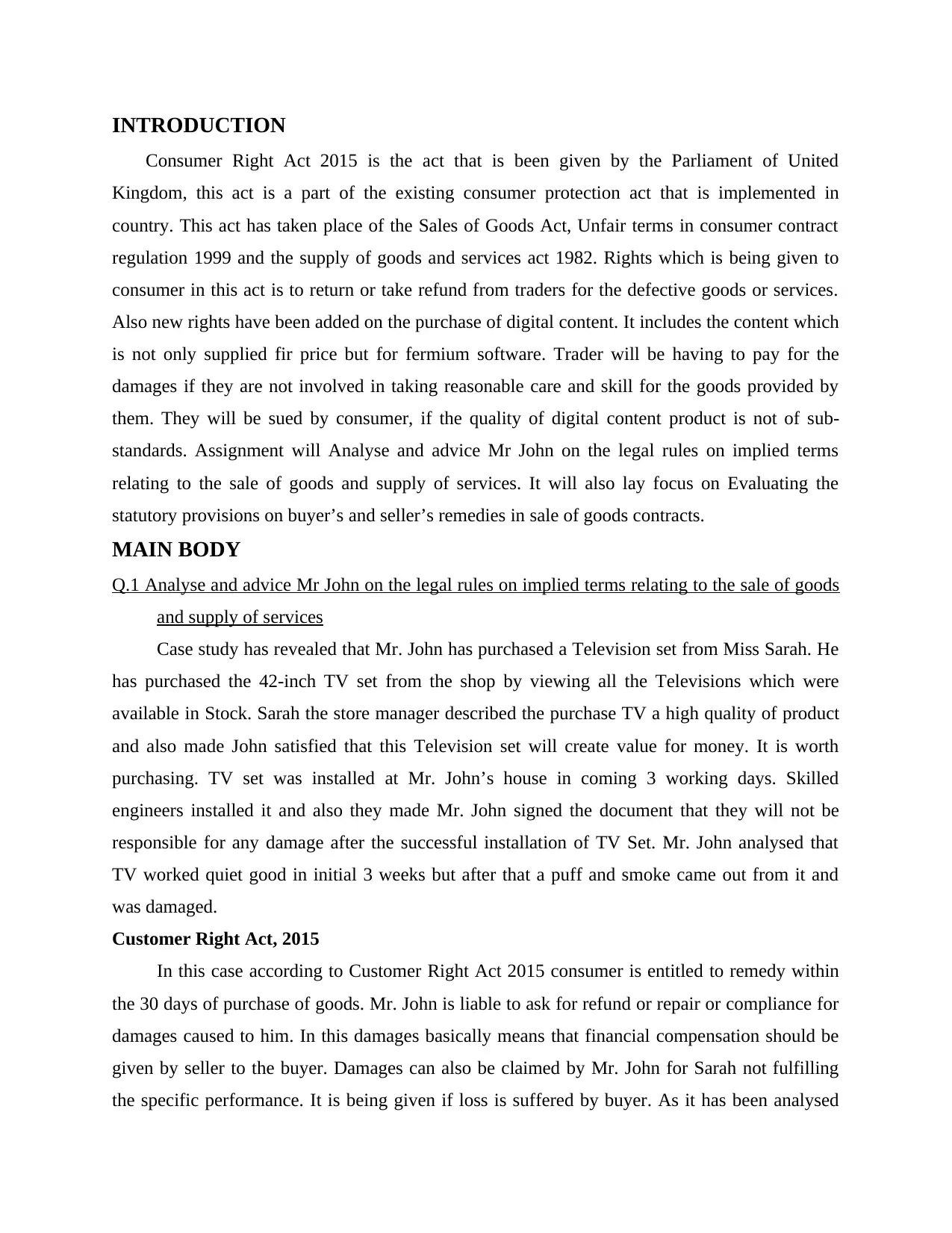
INTRODUCTION
Consumer Right Act 2015 is the act that is been given by the Parliament of United
Kingdom, this act is a part of the existing consumer protection act that is implemented in
country. This act has taken place of the Sales of Goods Act, Unfair terms in consumer contract
regulation 1999 and the supply of goods and services act 1982. Rights which is being given to
consumer in this act is to return or take refund from traders for the defective goods or services.
Also new rights have been added on the purchase of digital content. It includes the content which
is not only supplied fir price but for fermium software. Trader will be having to pay for the
damages if they are not involved in taking reasonable care and skill for the goods provided by
them. They will be sued by consumer, if the quality of digital content product is not of sub-
standards. Assignment will Analyse and advice Mr John on the legal rules on implied terms
relating to the sale of goods and supply of services. It will also lay focus on Evaluating the
statutory provisions on buyer’s and seller’s remedies in sale of goods contracts.
MAIN BODY
Q.1 Analyse and advice Mr John on the legal rules on implied terms relating to the sale of goods
and supply of services
Case study has revealed that Mr. John has purchased a Television set from Miss Sarah. He
has purchased the 42-inch TV set from the shop by viewing all the Televisions which were
available in Stock. Sarah the store manager described the purchase TV a high quality of product
and also made John satisfied that this Television set will create value for money. It is worth
purchasing. TV set was installed at Mr. John’s house in coming 3 working days. Skilled
engineers installed it and also they made Mr. John signed the document that they will not be
responsible for any damage after the successful installation of TV Set. Mr. John analysed that
TV worked quiet good in initial 3 weeks but after that a puff and smoke came out from it and
was damaged.
Customer Right Act, 2015
In this case according to Customer Right Act 2015 consumer is entitled to remedy within
the 30 days of purchase of goods. Mr. John is liable to ask for refund or repair or compliance for
damages caused to him. In this damages basically means that financial compensation should be
given by seller to the buyer. Damages can also be claimed by Mr. John for Sarah not fulfilling
the specific performance. It is being given if loss is suffered by buyer. As it has been analysed
Consumer Right Act 2015 is the act that is been given by the Parliament of United
Kingdom, this act is a part of the existing consumer protection act that is implemented in
country. This act has taken place of the Sales of Goods Act, Unfair terms in consumer contract
regulation 1999 and the supply of goods and services act 1982. Rights which is being given to
consumer in this act is to return or take refund from traders for the defective goods or services.
Also new rights have been added on the purchase of digital content. It includes the content which
is not only supplied fir price but for fermium software. Trader will be having to pay for the
damages if they are not involved in taking reasonable care and skill for the goods provided by
them. They will be sued by consumer, if the quality of digital content product is not of sub-
standards. Assignment will Analyse and advice Mr John on the legal rules on implied terms
relating to the sale of goods and supply of services. It will also lay focus on Evaluating the
statutory provisions on buyer’s and seller’s remedies in sale of goods contracts.
MAIN BODY
Q.1 Analyse and advice Mr John on the legal rules on implied terms relating to the sale of goods
and supply of services
Case study has revealed that Mr. John has purchased a Television set from Miss Sarah. He
has purchased the 42-inch TV set from the shop by viewing all the Televisions which were
available in Stock. Sarah the store manager described the purchase TV a high quality of product
and also made John satisfied that this Television set will create value for money. It is worth
purchasing. TV set was installed at Mr. John’s house in coming 3 working days. Skilled
engineers installed it and also they made Mr. John signed the document that they will not be
responsible for any damage after the successful installation of TV Set. Mr. John analysed that
TV worked quiet good in initial 3 weeks but after that a puff and smoke came out from it and
was damaged.
Customer Right Act, 2015
In this case according to Customer Right Act 2015 consumer is entitled to remedy within
the 30 days of purchase of goods. Mr. John is liable to ask for refund or repair or compliance for
damages caused to him. In this damages basically means that financial compensation should be
given by seller to the buyer. Damages can also be claimed by Mr. John for Sarah not fulfilling
the specific performance. It is being given if loss is suffered by buyer. As it has been analysed
⊘ This is a preview!⊘
Do you want full access?
Subscribe today to unlock all pages.

Trusted by 1+ million students worldwide
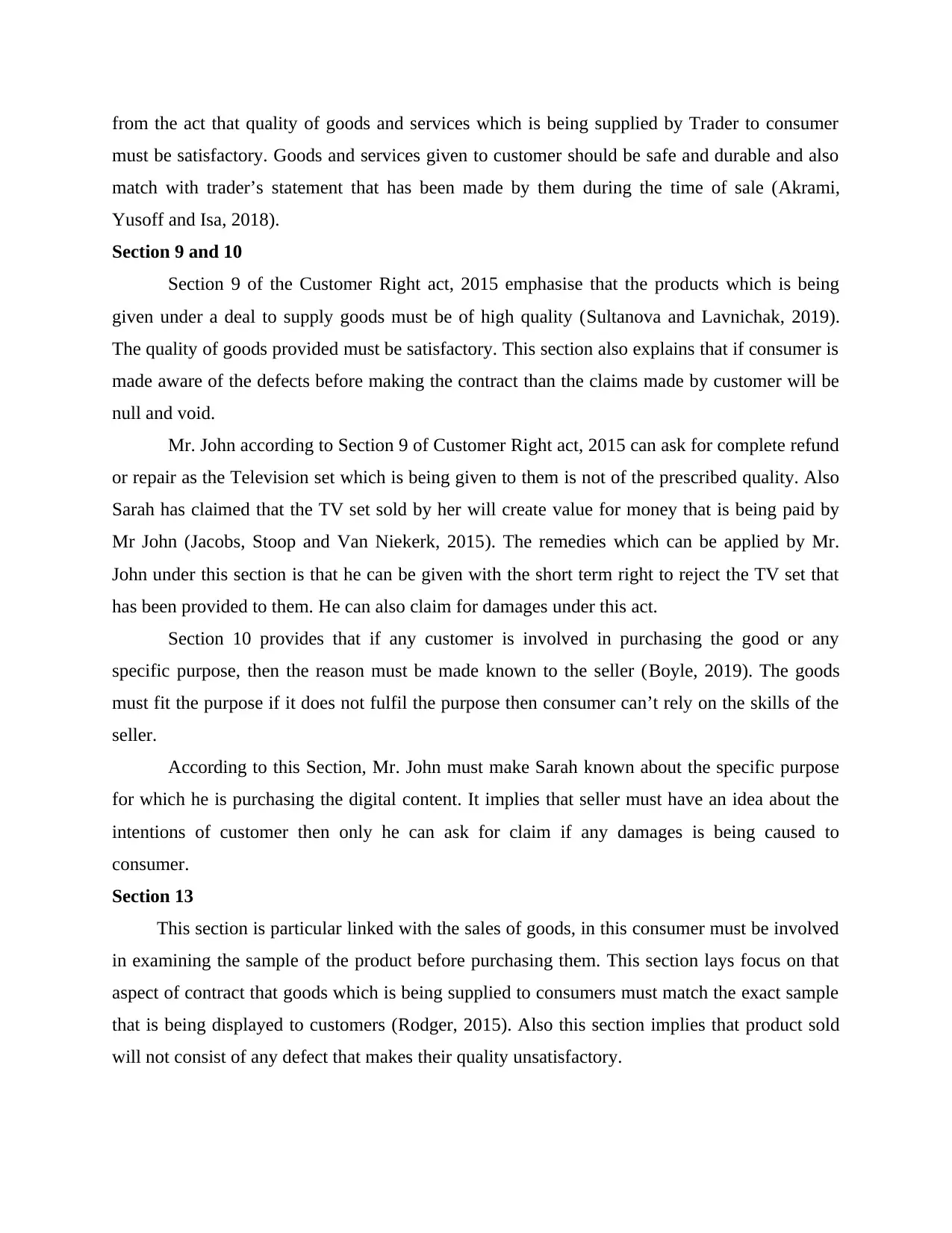
from the act that quality of goods and services which is being supplied by Trader to consumer
must be satisfactory. Goods and services given to customer should be safe and durable and also
match with trader’s statement that has been made by them during the time of sale (Akrami,
Yusoff and Isa, 2018).
Section 9 and 10
Section 9 of the Customer Right act, 2015 emphasise that the products which is being
given under a deal to supply goods must be of high quality (Sultanova and Lavnichak, 2019).
The quality of goods provided must be satisfactory. This section also explains that if consumer is
made aware of the defects before making the contract than the claims made by customer will be
null and void.
Mr. John according to Section 9 of Customer Right act, 2015 can ask for complete refund
or repair as the Television set which is being given to them is not of the prescribed quality. Also
Sarah has claimed that the TV set sold by her will create value for money that is being paid by
Mr John (Jacobs, Stoop and Van Niekerk, 2015). The remedies which can be applied by Mr.
John under this section is that he can be given with the short term right to reject the TV set that
has been provided to them. He can also claim for damages under this act.
Section 10 provides that if any customer is involved in purchasing the good or any
specific purpose, then the reason must be made known to the seller (Boyle, 2019). The goods
must fit the purpose if it does not fulfil the purpose then consumer can’t rely on the skills of the
seller.
According to this Section, Mr. John must make Sarah known about the specific purpose
for which he is purchasing the digital content. It implies that seller must have an idea about the
intentions of customer then only he can ask for claim if any damages is being caused to
consumer.
Section 13
This section is particular linked with the sales of goods, in this consumer must be involved
in examining the sample of the product before purchasing them. This section lays focus on that
aspect of contract that goods which is being supplied to consumers must match the exact sample
that is being displayed to customers (Rodger, 2015). Also this section implies that product sold
will not consist of any defect that makes their quality unsatisfactory.
must be satisfactory. Goods and services given to customer should be safe and durable and also
match with trader’s statement that has been made by them during the time of sale (Akrami,
Yusoff and Isa, 2018).
Section 9 and 10
Section 9 of the Customer Right act, 2015 emphasise that the products which is being
given under a deal to supply goods must be of high quality (Sultanova and Lavnichak, 2019).
The quality of goods provided must be satisfactory. This section also explains that if consumer is
made aware of the defects before making the contract than the claims made by customer will be
null and void.
Mr. John according to Section 9 of Customer Right act, 2015 can ask for complete refund
or repair as the Television set which is being given to them is not of the prescribed quality. Also
Sarah has claimed that the TV set sold by her will create value for money that is being paid by
Mr John (Jacobs, Stoop and Van Niekerk, 2015). The remedies which can be applied by Mr.
John under this section is that he can be given with the short term right to reject the TV set that
has been provided to them. He can also claim for damages under this act.
Section 10 provides that if any customer is involved in purchasing the good or any
specific purpose, then the reason must be made known to the seller (Boyle, 2019). The goods
must fit the purpose if it does not fulfil the purpose then consumer can’t rely on the skills of the
seller.
According to this Section, Mr. John must make Sarah known about the specific purpose
for which he is purchasing the digital content. It implies that seller must have an idea about the
intentions of customer then only he can ask for claim if any damages is being caused to
consumer.
Section 13
This section is particular linked with the sales of goods, in this consumer must be involved
in examining the sample of the product before purchasing them. This section lays focus on that
aspect of contract that goods which is being supplied to consumers must match the exact sample
that is being displayed to customers (Rodger, 2015). Also this section implies that product sold
will not consist of any defect that makes their quality unsatisfactory.
Paraphrase This Document
Need a fresh take? Get an instant paraphrase of this document with our AI Paraphraser
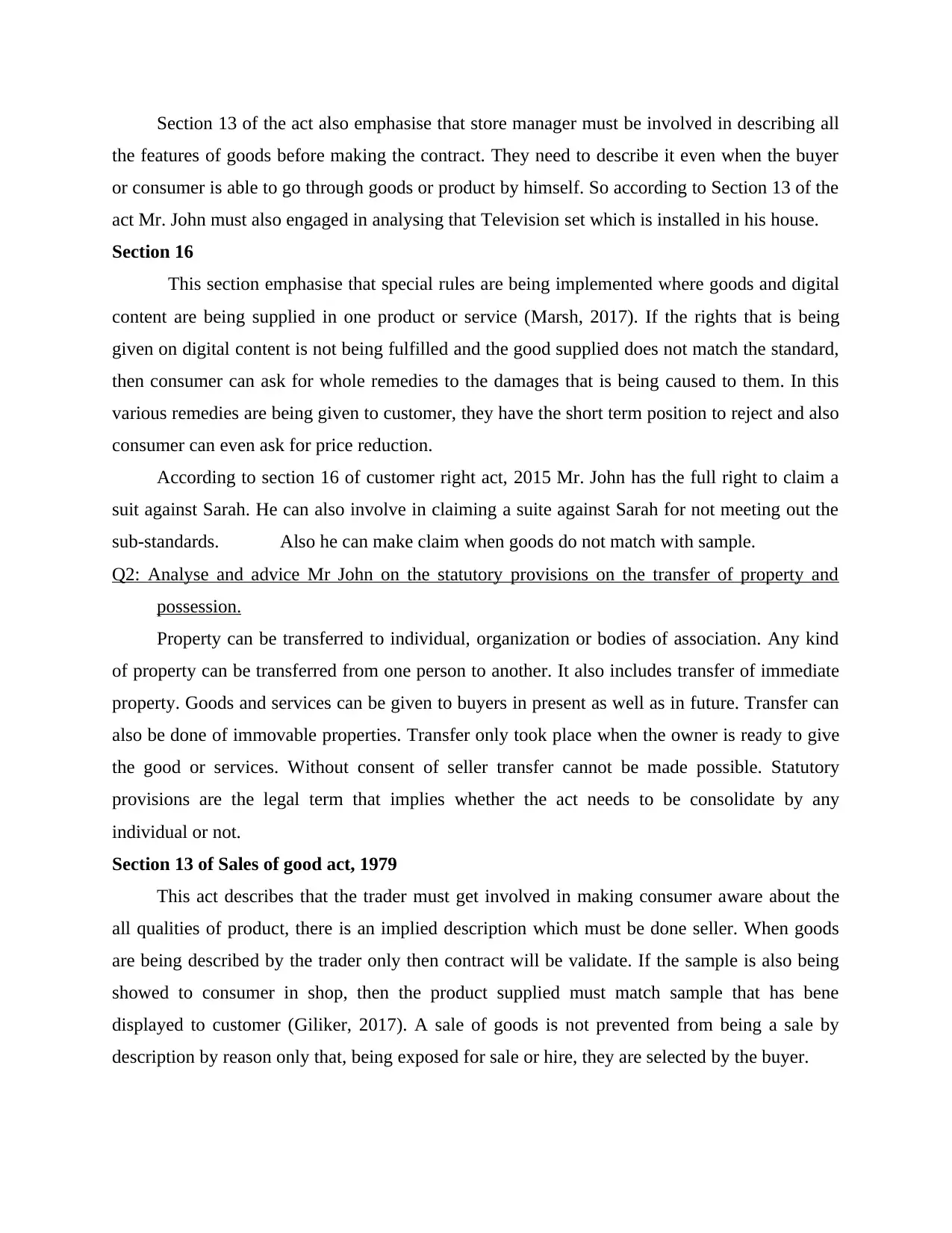
Section 13 of the act also emphasise that store manager must be involved in describing all
the features of goods before making the contract. They need to describe it even when the buyer
or consumer is able to go through goods or product by himself. So according to Section 13 of the
act Mr. John must also engaged in analysing that Television set which is installed in his house.
Section 16
This section emphasise that special rules are being implemented where goods and digital
content are being supplied in one product or service (Marsh, 2017). If the rights that is being
given on digital content is not being fulfilled and the good supplied does not match the standard,
then consumer can ask for whole remedies to the damages that is being caused to them. In this
various remedies are being given to customer, they have the short term position to reject and also
consumer can even ask for price reduction.
According to section 16 of customer right act, 2015 Mr. John has the full right to claim a
suit against Sarah. He can also involve in claiming a suite against Sarah for not meeting out the
sub-standards. Also he can make claim when goods do not match with sample.
Q2: Analyse and advice Mr John on the statutory provisions on the transfer of property and
possession.
Property can be transferred to individual, organization or bodies of association. Any kind
of property can be transferred from one person to another. It also includes transfer of immediate
property. Goods and services can be given to buyers in present as well as in future. Transfer can
also be done of immovable properties. Transfer only took place when the owner is ready to give
the good or services. Without consent of seller transfer cannot be made possible. Statutory
provisions are the legal term that implies whether the act needs to be consolidate by any
individual or not.
Section 13 of Sales of good act, 1979
This act describes that the trader must get involved in making consumer aware about the
all qualities of product, there is an implied description which must be done seller. When goods
are being described by the trader only then contract will be validate. If the sample is also being
showed to consumer in shop, then the product supplied must match sample that has bene
displayed to customer (Giliker, 2017). A sale of goods is not prevented from being a sale by
description by reason only that, being exposed for sale or hire, they are selected by the buyer.
the features of goods before making the contract. They need to describe it even when the buyer
or consumer is able to go through goods or product by himself. So according to Section 13 of the
act Mr. John must also engaged in analysing that Television set which is installed in his house.
Section 16
This section emphasise that special rules are being implemented where goods and digital
content are being supplied in one product or service (Marsh, 2017). If the rights that is being
given on digital content is not being fulfilled and the good supplied does not match the standard,
then consumer can ask for whole remedies to the damages that is being caused to them. In this
various remedies are being given to customer, they have the short term position to reject and also
consumer can even ask for price reduction.
According to section 16 of customer right act, 2015 Mr. John has the full right to claim a
suit against Sarah. He can also involve in claiming a suite against Sarah for not meeting out the
sub-standards. Also he can make claim when goods do not match with sample.
Q2: Analyse and advice Mr John on the statutory provisions on the transfer of property and
possession.
Property can be transferred to individual, organization or bodies of association. Any kind
of property can be transferred from one person to another. It also includes transfer of immediate
property. Goods and services can be given to buyers in present as well as in future. Transfer can
also be done of immovable properties. Transfer only took place when the owner is ready to give
the good or services. Without consent of seller transfer cannot be made possible. Statutory
provisions are the legal term that implies whether the act needs to be consolidate by any
individual or not.
Section 13 of Sales of good act, 1979
This act describes that the trader must get involved in making consumer aware about the
all qualities of product, there is an implied description which must be done seller. When goods
are being described by the trader only then contract will be validate. If the sample is also being
showed to consumer in shop, then the product supplied must match sample that has bene
displayed to customer (Giliker, 2017). A sale of goods is not prevented from being a sale by
description by reason only that, being exposed for sale or hire, they are selected by the buyer.
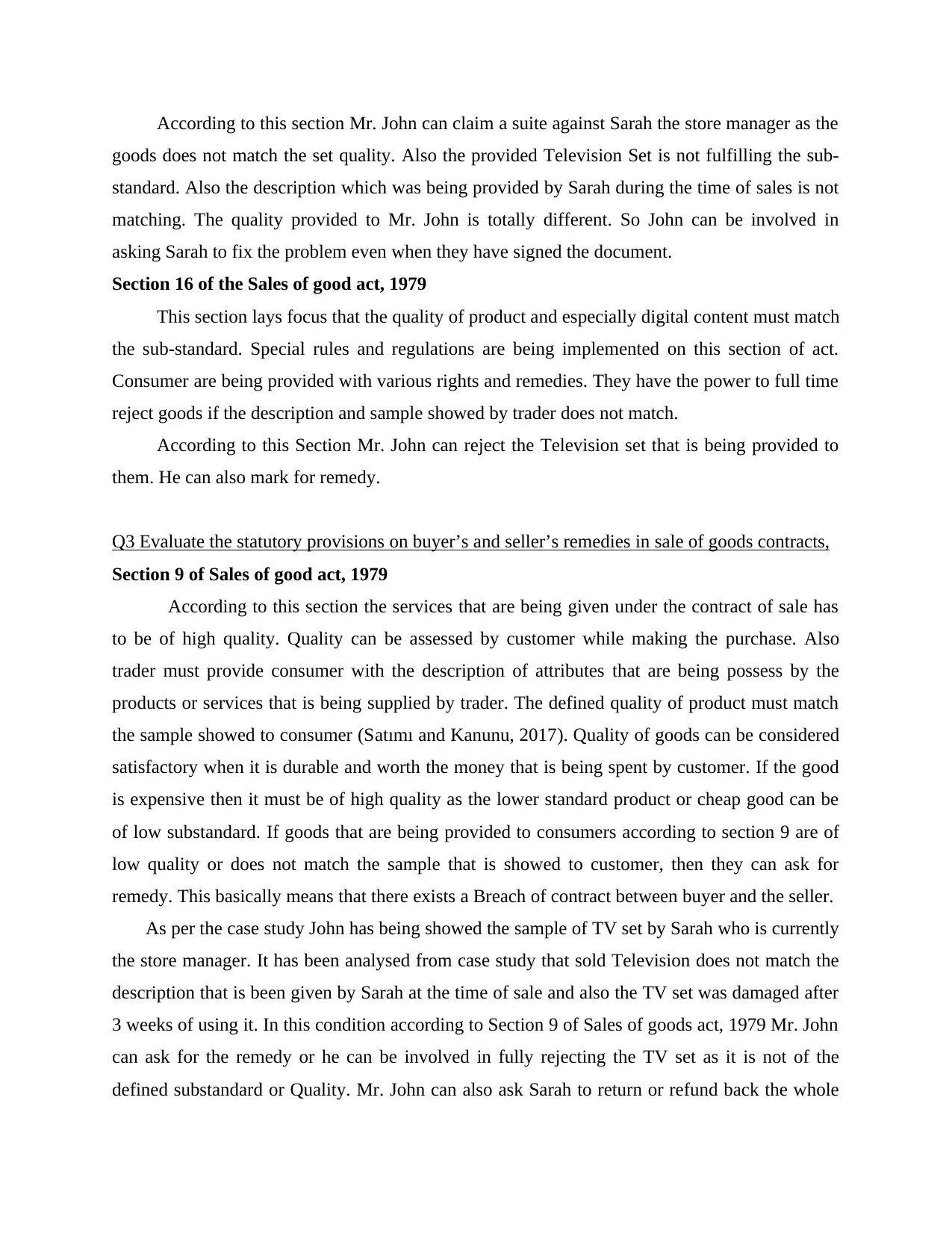
According to this section Mr. John can claim a suite against Sarah the store manager as the
goods does not match the set quality. Also the provided Television Set is not fulfilling the sub-
standard. Also the description which was being provided by Sarah during the time of sales is not
matching. The quality provided to Mr. John is totally different. So John can be involved in
asking Sarah to fix the problem even when they have signed the document.
Section 16 of the Sales of good act, 1979
This section lays focus that the quality of product and especially digital content must match
the sub-standard. Special rules and regulations are being implemented on this section of act.
Consumer are being provided with various rights and remedies. They have the power to full time
reject goods if the description and sample showed by trader does not match.
According to this Section Mr. John can reject the Television set that is being provided to
them. He can also mark for remedy.
Q3 Evaluate the statutory provisions on buyer’s and seller’s remedies in sale of goods contracts,
Section 9 of Sales of good act, 1979
According to this section the services that are being given under the contract of sale has
to be of high quality. Quality can be assessed by customer while making the purchase. Also
trader must provide consumer with the description of attributes that are being possess by the
products or services that is being supplied by trader. The defined quality of product must match
the sample showed to consumer (Satımı and Kanunu, 2017). Quality of goods can be considered
satisfactory when it is durable and worth the money that is being spent by customer. If the good
is expensive then it must be of high quality as the lower standard product or cheap good can be
of low substandard. If goods that are being provided to consumers according to section 9 are of
low quality or does not match the sample that is showed to customer, then they can ask for
remedy. This basically means that there exists a Breach of contract between buyer and the seller.
As per the case study John has being showed the sample of TV set by Sarah who is currently
the store manager. It has been analysed from case study that sold Television does not match the
description that is been given by Sarah at the time of sale and also the TV set was damaged after
3 weeks of using it. In this condition according to Section 9 of Sales of goods act, 1979 Mr. John
can ask for the remedy or he can be involved in fully rejecting the TV set as it is not of the
defined substandard or Quality. Mr. John can also ask Sarah to return or refund back the whole
goods does not match the set quality. Also the provided Television Set is not fulfilling the sub-
standard. Also the description which was being provided by Sarah during the time of sales is not
matching. The quality provided to Mr. John is totally different. So John can be involved in
asking Sarah to fix the problem even when they have signed the document.
Section 16 of the Sales of good act, 1979
This section lays focus that the quality of product and especially digital content must match
the sub-standard. Special rules and regulations are being implemented on this section of act.
Consumer are being provided with various rights and remedies. They have the power to full time
reject goods if the description and sample showed by trader does not match.
According to this Section Mr. John can reject the Television set that is being provided to
them. He can also mark for remedy.
Q3 Evaluate the statutory provisions on buyer’s and seller’s remedies in sale of goods contracts,
Section 9 of Sales of good act, 1979
According to this section the services that are being given under the contract of sale has
to be of high quality. Quality can be assessed by customer while making the purchase. Also
trader must provide consumer with the description of attributes that are being possess by the
products or services that is being supplied by trader. The defined quality of product must match
the sample showed to consumer (Satımı and Kanunu, 2017). Quality of goods can be considered
satisfactory when it is durable and worth the money that is being spent by customer. If the good
is expensive then it must be of high quality as the lower standard product or cheap good can be
of low substandard. If goods that are being provided to consumers according to section 9 are of
low quality or does not match the sample that is showed to customer, then they can ask for
remedy. This basically means that there exists a Breach of contract between buyer and the seller.
As per the case study John has being showed the sample of TV set by Sarah who is currently
the store manager. It has been analysed from case study that sold Television does not match the
description that is been given by Sarah at the time of sale and also the TV set was damaged after
3 weeks of using it. In this condition according to Section 9 of Sales of goods act, 1979 Mr. John
can ask for the remedy or he can be involved in fully rejecting the TV set as it is not of the
defined substandard or Quality. Mr. John can also ask Sarah to return or refund back the whole
⊘ This is a preview!⊘
Do you want full access?
Subscribe today to unlock all pages.

Trusted by 1+ million students worldwide
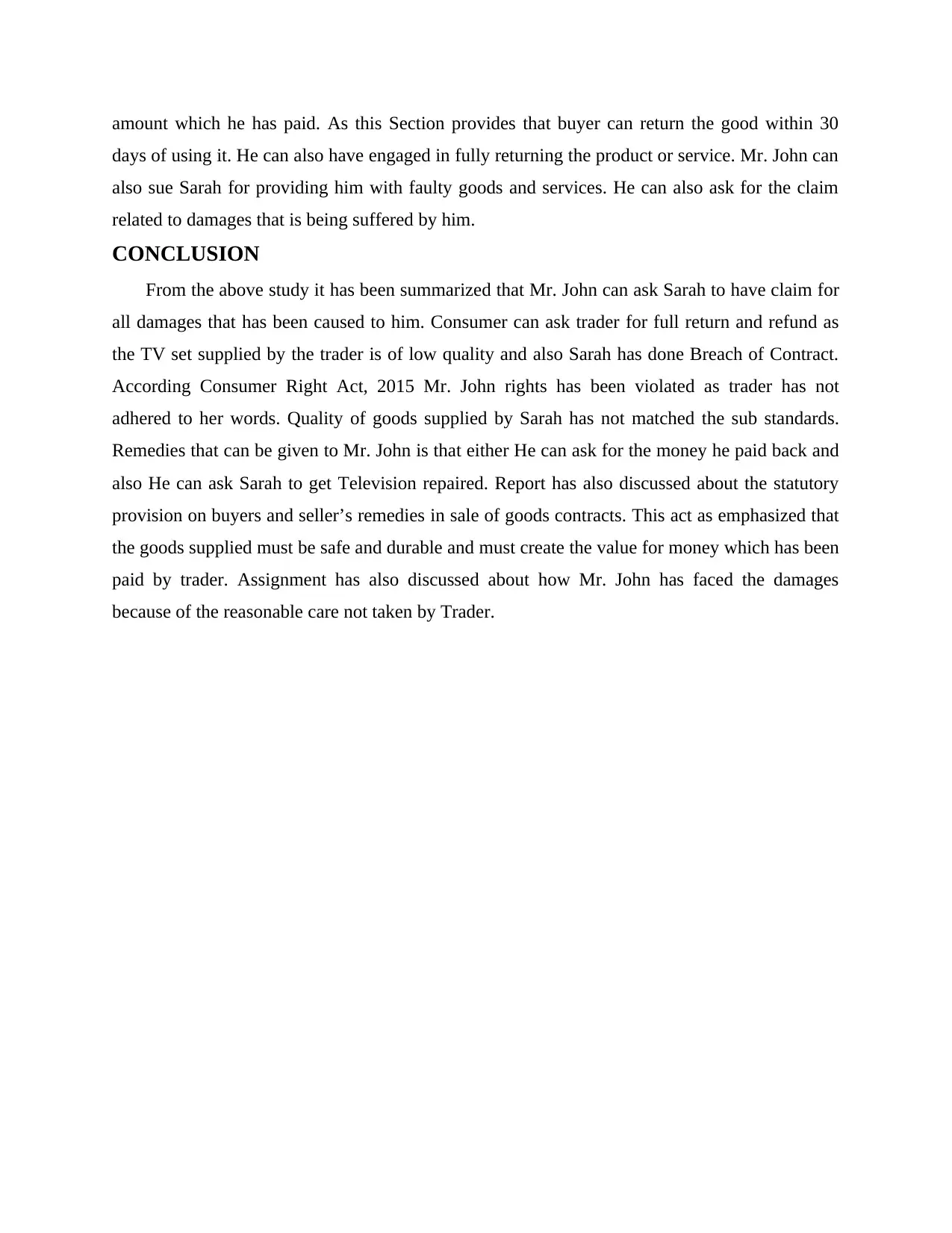
amount which he has paid. As this Section provides that buyer can return the good within 30
days of using it. He can also have engaged in fully returning the product or service. Mr. John can
also sue Sarah for providing him with faulty goods and services. He can also ask for the claim
related to damages that is being suffered by him.
CONCLUSION
From the above study it has been summarized that Mr. John can ask Sarah to have claim for
all damages that has been caused to him. Consumer can ask trader for full return and refund as
the TV set supplied by the trader is of low quality and also Sarah has done Breach of Contract.
According Consumer Right Act, 2015 Mr. John rights has been violated as trader has not
adhered to her words. Quality of goods supplied by Sarah has not matched the sub standards.
Remedies that can be given to Mr. John is that either He can ask for the money he paid back and
also He can ask Sarah to get Television repaired. Report has also discussed about the statutory
provision on buyers and seller’s remedies in sale of goods contracts. This act as emphasized that
the goods supplied must be safe and durable and must create the value for money which has been
paid by trader. Assignment has also discussed about how Mr. John has faced the damages
because of the reasonable care not taken by Trader.
days of using it. He can also have engaged in fully returning the product or service. Mr. John can
also sue Sarah for providing him with faulty goods and services. He can also ask for the claim
related to damages that is being suffered by him.
CONCLUSION
From the above study it has been summarized that Mr. John can ask Sarah to have claim for
all damages that has been caused to him. Consumer can ask trader for full return and refund as
the TV set supplied by the trader is of low quality and also Sarah has done Breach of Contract.
According Consumer Right Act, 2015 Mr. John rights has been violated as trader has not
adhered to her words. Quality of goods supplied by Sarah has not matched the sub standards.
Remedies that can be given to Mr. John is that either He can ask for the money he paid back and
also He can ask Sarah to get Television repaired. Report has also discussed about the statutory
provision on buyers and seller’s remedies in sale of goods contracts. This act as emphasized that
the goods supplied must be safe and durable and must create the value for money which has been
paid by trader. Assignment has also discussed about how Mr. John has faced the damages
because of the reasonable care not taken by Trader.
Paraphrase This Document
Need a fresh take? Get an instant paraphrase of this document with our AI Paraphraser
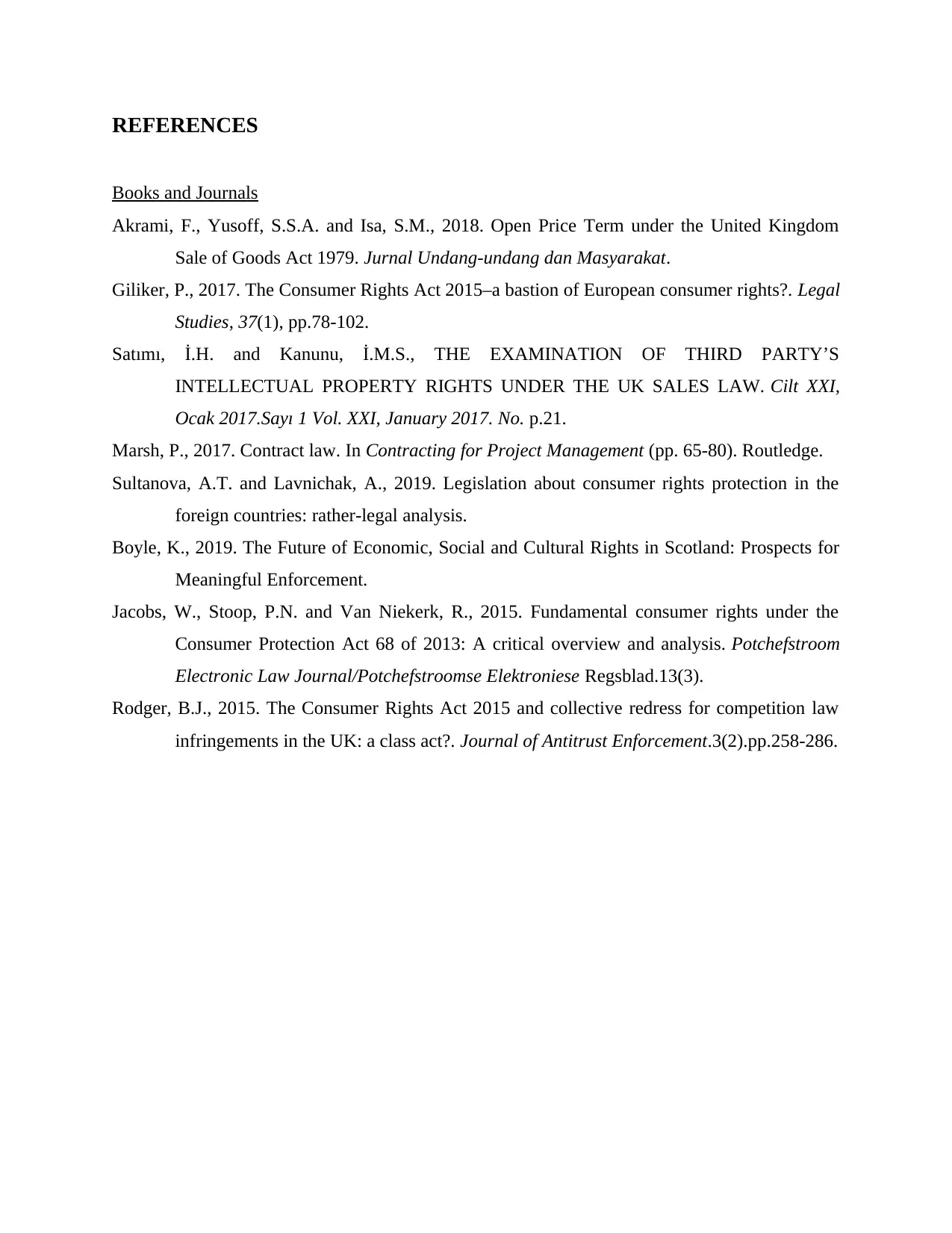
REFERENCES
Books and Journals
Akrami, F., Yusoff, S.S.A. and Isa, S.M., 2018. Open Price Term under the United Kingdom
Sale of Goods Act 1979. Jurnal Undang-undang dan Masyarakat.
Giliker, P., 2017. The Consumer Rights Act 2015–a bastion of European consumer rights?. Legal
Studies, 37(1), pp.78-102.
Satımı, İ.H. and Kanunu, İ.M.S., THE EXAMINATION OF THIRD PARTY’S
INTELLECTUAL PROPERTY RIGHTS UNDER THE UK SALES LAW. Cilt XXI,
Ocak 2017.Sayı 1 Vol. XXI, January 2017. No. p.21.
Marsh, P., 2017. Contract law. In Contracting for Project Management (pp. 65-80). Routledge.
Sultanova, A.T. and Lavnichak, A., 2019. Legislation about consumer rights protection in the
foreign countries: rather-legal analysis.
Boyle, K., 2019. The Future of Economic, Social and Cultural Rights in Scotland: Prospects for
Meaningful Enforcement.
Jacobs, W., Stoop, P.N. and Van Niekerk, R., 2015. Fundamental consumer rights under the
Consumer Protection Act 68 of 2013: A critical overview and analysis. Potchefstroom
Electronic Law Journal/Potchefstroomse Elektroniese Regsblad.13(3).
Rodger, B.J., 2015. The Consumer Rights Act 2015 and collective redress for competition law
infringements in the UK: a class act?. Journal of Antitrust Enforcement.3(2).pp.258-286.
Books and Journals
Akrami, F., Yusoff, S.S.A. and Isa, S.M., 2018. Open Price Term under the United Kingdom
Sale of Goods Act 1979. Jurnal Undang-undang dan Masyarakat.
Giliker, P., 2017. The Consumer Rights Act 2015–a bastion of European consumer rights?. Legal
Studies, 37(1), pp.78-102.
Satımı, İ.H. and Kanunu, İ.M.S., THE EXAMINATION OF THIRD PARTY’S
INTELLECTUAL PROPERTY RIGHTS UNDER THE UK SALES LAW. Cilt XXI,
Ocak 2017.Sayı 1 Vol. XXI, January 2017. No. p.21.
Marsh, P., 2017. Contract law. In Contracting for Project Management (pp. 65-80). Routledge.
Sultanova, A.T. and Lavnichak, A., 2019. Legislation about consumer rights protection in the
foreign countries: rather-legal analysis.
Boyle, K., 2019. The Future of Economic, Social and Cultural Rights in Scotland: Prospects for
Meaningful Enforcement.
Jacobs, W., Stoop, P.N. and Van Niekerk, R., 2015. Fundamental consumer rights under the
Consumer Protection Act 68 of 2013: A critical overview and analysis. Potchefstroom
Electronic Law Journal/Potchefstroomse Elektroniese Regsblad.13(3).
Rodger, B.J., 2015. The Consumer Rights Act 2015 and collective redress for competition law
infringements in the UK: a class act?. Journal of Antitrust Enforcement.3(2).pp.258-286.

1
⊘ This is a preview!⊘
Do you want full access?
Subscribe today to unlock all pages.

Trusted by 1+ million students worldwide
1 out of 9
Related Documents
Your All-in-One AI-Powered Toolkit for Academic Success.
+13062052269
info@desklib.com
Available 24*7 on WhatsApp / Email
![[object Object]](/_next/static/media/star-bottom.7253800d.svg)
Unlock your academic potential
Copyright © 2020–2026 A2Z Services. All Rights Reserved. Developed and managed by ZUCOL.




